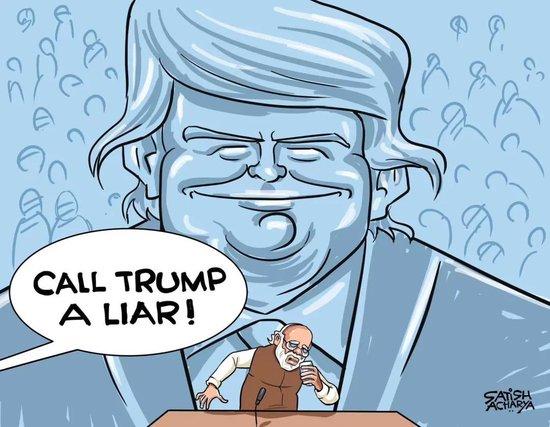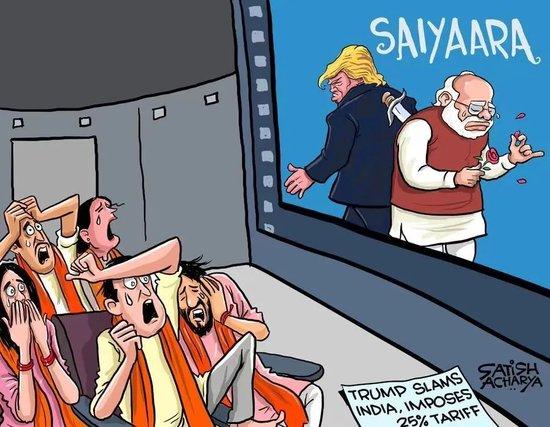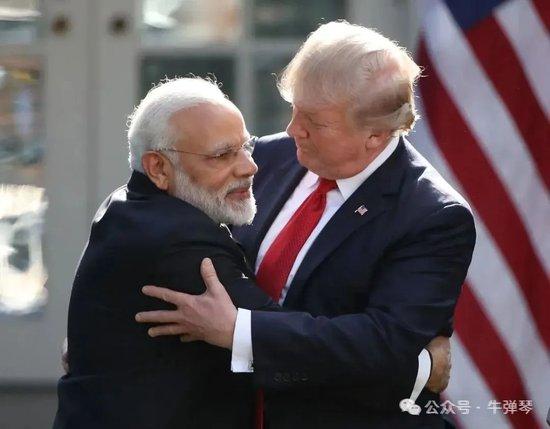


Not Simple, India Begins to Retaliate.
This has caused Trump a big headache.
The day before, Trump had declared that under his strong pressure,
India would no longer purchase oil from Russia and he was “waiting.”
The next day (August 2), two anonymous senior Indian officials made a statement, indicating that the government policy remains unchanged, and Russia’s oil will continue to be purchased as usual.
I saw headlines from Western media stating,
“India is not afraid of US tariff pressure and will continue to purchase Russian oil.”
Isn’t this deliberately making Trump uncomfortable?
India can’t change its policy because it concerns India’s national interests.
Indian officials stated that the government has not instructed oil companies to reduce their imports from Russia, and these are long-term oil contracts, not something that can be stopped overnight.
Trump, you’ve created another fake news story. How could such a military matter be handled with “hearsay”?
It seems Trump cannot entirely blame himself.
After reviewing the source, it was Reuters or so-called “news,” claiming that India is no longer buying Russian oil, based on an argument:
Several state-owned refineries in India have not purchased Russian crude oil over the past week.
However, according to Indian sources, the reduction in purchases is not due to threats from Trump but rather due to reduced Russian exports, stable demand in India, and lower discounts for Russian oil.
Such results must surely disappoint Trump.
Previously, Trump criticized India for being unprincipled and purchasing Russian oil, announcing tariffs of 25% on India and imposing penalties.
Moreover, he threatened Russia, declaring that if Russia does not reach a ceasefire with Ukraine within ten days, sanctions against Russia would be imposed, known as secondary sanctions, whereby anyone who buys Russian oil will face a 100% tariff.
In any case, for Trump, tariffs are all-powerful, and without them, nothing is possible.
According to external sources, the three main buyers are China, India, and Turkey.
India’s share is particularly high.
Currently, India is the third-largest oil importer in the world after China and the United States, with Russia also being India’s largest supplier of oil.
Data shows that in January 2022, India imported 68,000 barrels of oil per day from Russia, which increased to 1.12 million barrels per day in June of the same year; at its peak, it exceeded 2 million barrels, sometimes even more than China.
Russian discounted oil accounts for up to 40% of India’s oil import volume.
Imagine what impact a complete cessation of Russian oil would have on India’s oil supply and the entire Indian economy.
Trump believed that India was a soft target, believing that by applying pressure, India would comply and stop importing, but this was overly optimistic.
Beyond economic interests, there are also complex geopolitical factors at play.
The relationship between the United States and India is good, with Trump frequently showing affection towards Modi, often embracing or holding hands.
However, the relationship between India and Russia is far more profound and long-standing.
During the Cold War era, remember that the Soviet Union was always India’s quasi-ally, with the US and Pakistan on one side, and the Soviet Union on the other. Most of India’s weapons were sourced from the Soviet Union, and during the Indo-Pakistani issue, the Soviet Union had used veto power multiple times on India’s behalf.
Putin and Modi have also met dozens of times as old friends.
Indian Foreign Minister Sushma Swaraj praised the India-Russia relationship as “an eternal constant in world politics.”
I’ve seen Western media comment:
The deep mutual dependence in energy, military, nuclear energy, and high-level diplomacy among India and Russia constitutes a solid foundation that cannot be easily dismantled through a single economic lever (such as tariffs). This means that the US’s “extra punishment” may not be sufficient to fundamentally change India’s strategic considerations, as cutting off these connections would be a significant cost for India.
Therefore, even in the face of Trump’s blunders, India stands firm: we will continue to purchase Russian oil as usual.
This is not the first time India has rebuked Trump.
Previously, Trump’s various claims that he was actively mediating and exerting pressure led to a ceasefire between India and Pakistan. This angered India, which detests being forced into a ceasefire. Trump, you are hitting the wrong target with your latest move.
In the end, India clarified that there is no connection between the ceasefire and Trump. Many Indians have lashed out at Trump, calling him a liar.
For Trump, who longs for a Nobel Peace Prize, this undoubtedly
was not lost on him.
Trump had also claimed:
“I don’t care how India treats Russia; they can team up against each other’s dying economies…”
Please note, Trump, known for his nickname-giving tendencies, has once again labeled India.
Can an Indian accept this? It is an open insult to India.
The Office of the Prime Minister of India responded:
“India’s economy is vibrant and resilient,” ”
Modi’s economic policies are not only alive but also stand out as the only bright spot amidst the world of protectionism.”
Is this another slap in Trump’s face?
Firstly, Trump really overestimated himself.
Dreaming of imposing pressure and having India stop purchasing Russian oil, Trump must be thinking something else.
Does he think he can manipulate India?
Some things can be influenced by tariffs; however, some relationships cannot be significantly altered by them.
But this puts Trump in an awkward position.
How will he fulfill his promises now?
If he cannot impose “additional sanctions” on India, then his so-called sanctions against Russia would be nothing more than empty rhetoric; if he could, then the relationship between the US and India would undergo significant changes.
Of course, for Trump, if it becomes impossible, changing his wording would suffice. After all, he surely won, and winning big is not a problem anymore.
Secondly, the strategic balance is being disrupted.
India, once upon a time, had a dream of being able to navigate the political landscape with ease.
As per Bloomberg, India was at the “sweet spot” of geopolitics, engaging in multilateral cooperation with the United States, Japan, and Australia, while also being a member of the BRICS group alongside China and Russia.
“This allowed Modi to visit the White House and deepen his cooperation with Putin, but Trump is breaking this strategic balance,” they said.
Of course, we need not shy away from the fact that India has always been a bargaining chip for the West against China. Some Indians are quite willing to be the chips on the table, offering various tokens of allegiance.
Who would have thought that Trump’s ascendancy would care little about these so-called chips; you are just a pawn, and if you don’t play my way, I will severely insult you.
The myth of India is crumbling.
Thirdly, there’s the saying that “bad people are made by bad people.”
We Chinese know well that India is not a light bulb; Modi is a master of the game of politics; of course, Trump does not believe in fair play and refuses to settle for less than what he wants.
It’s like meeting an adversary who is equally skilled, where Modi wins by learning from Trump, and vice versa. The cycle of conflict continues.
On a side note, India and Canada have had their issues, yet they have become like brothers in adversity.
Canada has recently been feeling frustrated, as the US imposes tariffs of 15% on Japan, South Korea, and the EU, yet Canada consistently steps up to help the US, only to be hit first by Trump with a 35% tax increase.
Brian Crowley, a former Canadian government official, lamented that other countries choose to compromise with the US, leaving Canada “on its own” now.
“Regrettably, now as China, Canada has become the only country that dares to stand up against this president (Trump).”
So, could there be another India?